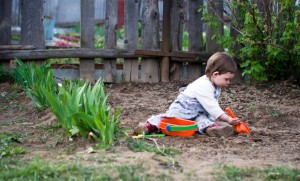READY TO GET STARTED?
REQUEST A FREE ESTIMATE
Fill out the form below or call (888) 466-7849 for a free, no-obligation estimate.
 This past weekend I was outside working in the garden when I came across a few unwanted guests. There were a few spiders, a couple ground beetles, and a large amount of ants. The ants and beetles were present because my garden provides them with a large amount of food and water. The spiders were there because my garden provides them food (the other insects).
This past weekend I was outside working in the garden when I came across a few unwanted guests. There were a few spiders, a couple ground beetles, and a large amount of ants. The ants and beetles were present because my garden provides them with a large amount of food and water. The spiders were there because my garden provides them food (the other insects).
As most of you know the most common insecticides should not be used in gardens. Leaving the everyday gardener to reach out to “over the counter” products from their local nursery or hardware store to help rid them of pests. Although many of these products are effective for short periods of time, they require a minimum time lapse before you can harvest your yield. As many of you know, at Northwest Exterminating we care about protecting your family from pests in the most natural ways possible. And when it comes to the family garden our service technicians are trained to stop the pest before they enter the garden area. That being said, a lot of the garden insects start in the garden area and never leave it – making it hard to control them. So what can you do? Below I have listed some natural ways to help assist you in keeping the pest populations down in your family’s garden this growing season. Following these steps and methods will ensure a healthy garden with minimal pesticide use.
Environmental Tips:
Natural Plantings You Can Add To Help Keep The Pests Down:
We hope some of these tips help you keep your family garden healthier this season! For more information on Northwest’s Pest Control and Lawn Care Services visit us at callnorthwest.com
Adam Vannest
Director of Pest ServicesNorthwest Exterminating
[email protected]
 This past weekend I was outside working in the garden when I came across a few unwanted guests. There were a few spiders, a couple ground beetles, and a large amount of ants. The ants and beetles were present because my garden provides them with a large amount of food and water. The spiders were there because my garden provides them food (the other insects).
This past weekend I was outside working in the garden when I came across a few unwanted guests. There were a few spiders, a couple ground beetles, and a large amount of ants. The ants and beetles were present because my garden provides them with a large amount of food and water. The spiders were there because my garden provides them food (the other insects).
As most of you know the most common insecticides should not be used in gardens. Leaving the everyday gardener to reach out to “over the counter” products from their local nursery or hardware store to help rid them of pests. Although many of these products are effective for short periods of time, they require a minimum time lapse before you can harvest your yield. As many of you know, at Northwest Exterminating we care about protecting your family from pests in the most natural ways possible. And when it comes to the family garden our service technicians are trained to stop the pest before they enter the garden area. That being said, a lot of the garden insects start in the garden area and never leave it – making it hard to control them. So what can you do? Below I have listed some natural ways to help assist you in keeping the pest populations down in your family’s garden this growing season. Following these steps and methods will ensure a healthy garden with minimal pesticide use.
Environmental Tips:
Natural Plantings You Can Add To Help Keep The Pests Down:
We hope some of these tips help you keep your family garden healthier this season! For more information on Northwest’s Pest Control and Lawn Care Services visit us at callnorthwest.com
Adam Vannest
Director of Pest ServicesNorthwest Exterminating
[email protected]
Just like any living being, lawns need TLC too. Throughout the seasons, climates, and general wear and tear, lawns can become damaged. The ground gets hard and compacted, not allowing water and nutrients to get through. This can make for an unhealthy lawn.
Aerating can be just what your lawn needs to allow it to “open back up” and be able to receive its water and nutrients again. Aerating consists of inserting holes into the lawn for better water and nutrient absorption, and eliminating thatch (organic and non-organic debris that settles between the green and the soil). All of this build up makes the soil hard and compacted. Aerating will loosen the compacted soil and allow your grass to grow faster and thicker.
Aeration will make your lawn treatments more effective. Oxygen, fertilizer, water, and other nutrients will be better absorbed.
It is recommended that cool season grass be aerated in the fall. Warm season grass should be aerated in spring or summer.
For more information on aeration and other lawn care services, contact the professionals at Northwest Lawn Care. We will come out and do a FREE lawn care analysis of your lawn and work with you to create a customized lawn care program that is right for your yard.